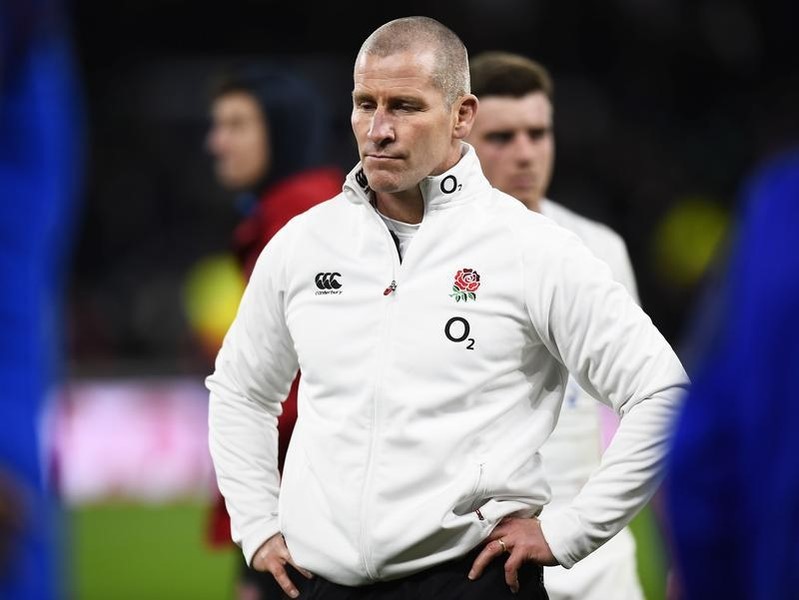By Mitch Phillips
LONDON (Reuters) - England coach Stuart Lancaster, having named a bumper 50-man World Cup training squad and left the door open for yet further additions, might appear to be flailing desperately with the tournament only four months away.
But anyone who knows him will be well aware of how much time and energy Lancaster and his assistants put into tracking and analysing every aspect of his potential players' performances.
So it was no surprise to hear him say on Wednesday that, despite unveiling a seemingly bloated group, he already had a fair idea of who would make up the bulk of the final 31-man squad that has to be named by the end of August.
Including so many other players at this stage was more of a precautionary measure, he added reassuringly.
Lancaster has been building towards this tournament since he took over early in 2012, and arguably before that in his role as head of elite development and coach of the second-string Saxons team.
He is a huge believer in England's "performance pathway", where the cream of the nation's schoolboy talent is identified and nurtured through the various age-group teams so by the time they have joined professional clubs they have been immersed in the culture and expectation of the international set-up.
"We feel we have tremendous strength in depth," Lancaster said at Twickenham after announcing a squad too all-encompassing to give any indication of his final thoughts.
"We have an idea of the core group of 31 but a lot of players will push very hard and everyone should be thinking they have a shot."
TALKING POINT
The biggest talking point for the British media was the exclusion of France-based duo Steffon Armitage and Nick Abendanon.
However, Lancaster has never given the slightest indication he would invoke the Rugby Football Union's "extraordinary circumstances" clause to give the current and former European players of the year a way back and gave a forthright defence of the policy again on Wednesday.
He did, though, recall two other experienced operators who must have felt their chance had gone -- wingers Chris Ashton and Dave Strettle.
Ashton was England's main strike weapon in his early years but has not played in the last two Six Nations tournaments, while Strettle has spent his entire career being selected and discarded by his country having not featured since 2013.
Both men have made their case on the scoreboard for Saracens this season and have been given the chance to press for a winger's berth alongside likely starter Anthony Watson.
"The door was never closed and they've forced it open with their performances," Lancaster said.
With England likely to face some flanker-sized wingers in World Cup pool games against Fiji, Wales and Australia, the diminutive Christian Wade was left out while pacey but defensively-suspect Jonny May and Marland Yarde have something to prove.
So too do the seven uncapped players who have a couple of training camps and a potential game against the Barbarians to try to force their way into the final reckoning.
INTRIGUING ADDITION
While 20-year-old flanker/lock Maro Itoje is the romantic late "bolter", it is rugby league convert Sam Burgess who looks the most intriguing addition.
Having switched codes to join Bath this season, Burgess has made rapid progress despite the unusual situation of him bouncing between the flanker and centre positions.
While he is still getting to grips with the nuances of the breakdown, his ferocious tackling, appetite for work and total commitment to the team are highly regarded by Lancaster and mean he has a strong chance of making the final squad.
However, while the fringe players are attracting attention at the moment it is England's already-established hard core who will ultimately have to perform if they are to prevail on home soil.
In that regard Lancaster has a relatively settled group with the proven ability to beat anyone on their day -- South Africa are the only side he has yet to taste victory over.
The pack, led by ultra-consistent captain Chris Robshaw, in particular compares with any in the game and can set the platform for England to flourish in front of their own fans.
George Ford has quickly developed into an attack-minded international flyhalf while Jonathan Joseph and Watson especially have introduced the pace and verve that has been missing for so long in England's backline.
They are not yet near the settled, almost invincible 2003 unit of Clive Woodward, who remain the only European team to have won the World Cup.

But England are on the right path and being led along it by a coach who has planned every single step towards their ultimate destination back at Twickenham in the final on Oct. 31.